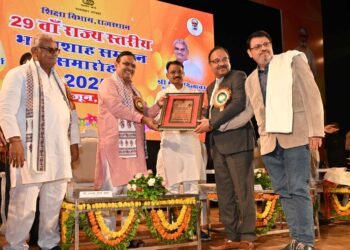Ashish Dhawan, Founder-Chairman of Central Square Foundation, and Chairman of Ashoka University said, the National Education Policy 2020 is a landmark policy with focus on Learning Outcomes, Exam Reforms, and Foundational Learning among other critical issues.
In an interview with Apresh Mishra, he discusses on the policy, CSR, and role of Central Square Foundation in new policy regime. Excerpts:
Your quick comment on National Education Policy 2020?
I think it’s a landmark policy and has come after 34 years. If you look at education in India, last 34 years since the last policy was announced, were focused on improving access and equity i.e. getting children to schools, improving enrolment in secondary schools and higher education.
We have made remarkable strides in this area as we now have almost universal enrolment in primary elementary school, and about 80% enrolment in lower secondary classes i.e.9th and 10th.
Now, we’re starting to have the conversation about learning outcomes. This is important because what we’ve seen is learning levels are low and they have remained flat for the last decade.
I think it’s saying let’s first focus on foundation. Basically, by class three children can’t read and write and do basic arithmetic. They are then shut out from the world of learning.
But how do we now ensure that learning and quality improve? NEP has announced National Foundational Literacy and Numeracy (FLN) Mission, which is an important step towards ensuring that our childrenby grade 3, have critical gateway skills of reading with meaning and basic maths. Importantly, NEP calls out and sets a deadline of 2025 to achieve FLN.
For this to happen, we have to set clear goals, and measure it. In this context, the newinstitute called PARAKH, which will be an independent learningNational Assessment Center is like the single biggest reform.
Second one is board exam reform. I think this idea of slightly lower stakes board exam, less focused on rote, more multi-disciplinary, holistic is huge because it will have cascading effects through not just secondary school, but back down into middle school in primary school because currently parents are so focused on class 10 and 12 board exams.
We even need learning markers at the end of classes three, five and eight as well. UK has four keystage exams. At every key stage, there’s an exam. This will also help us understand the performance of children in private schools as most private schools in our country end even before reaching board class level. So that’s how I think we need to use assessment and learning data going forward. And that’s the architecture I think the policy gets.
Thirdly, on school education side, the policy recognises private schools as major stakeholders and calls for light regulation. So lighter touch regulation will provide level playing field for private and government schools both. The License Raj has to go but at the same time, we need transparency. Private schools have to disclose certain basic data so that parents can make more informed choices.
We have the largest school education system in the world with 250 million children in our schools. 35 million go to college. There are 75 million preschool and Anganwadi children. So to move a system like this takes time. But I believe the new policy will help move the country in a direction.
What role do you see for CSR in next policy regime?
Given that we have a national FLN mission, CSR should see how they can support this mission. The real opportunity for CSR would be to get involved strategically at the state level.
They can fund NGOs that will help train teachers, help with the curriculum, help build data systems, etc. Corporates should focus more on the software as opposed to the hardware.
I think CSR can move its money away from infrastructure and material to more funding in use at a state level. They can find an NGO that has already worked for many years at the state, has expertise in primary education and work with them to change their model to become more of a state support model versus running their own program.
The outcomes will come through the capacity rebuilding, coaching, monitoring, etc. Ifcorporates change the paradigm; they can really become very effective partners at the state level to make this mission a reality.
What role do you see for Central Square Foundation in NEP 2020?
One is supporting at the centre with whatever help they need. We can help in building the assessment centre, as learning data is critical to the success of the FLN mission. Second is supporting state governments in effective implementation of the mission.
We are already working at the state level on what, I was telling you, CSR could do. The Chief Minister in Uttar Pradesh launched Mission Prerna and we are providing technical support to the state government through a project management unit. And, then with people who are working on literacy and numeracy, in partnership with their ICT.
In Madhya Pradesh, we have a similar approach. We have set up a project management unit, have a numeracy and literacy partner; and are running a Foundational Learning Center in the state. In Gujarat, we have partnered with the Larry Ellison foundation that is doing a similar program with the state government.
Also, in Haryana, we have partnered with Language and Learning Foundation. They are already working in seven of the 22 districts of the state. Subsequently, this will become a state-wide initiative.
All of these are not NGO programs. Our job is to come in and support the state in implementing its programs, helping in the capacity development, monitoring, building the tools that they need, developing the learning outcomes framework, among others.
Our goal is to provide support on technical areas like setting up a National Assessment Centre, or anything that’s needed to support the mission. But then we will direct most of our effort at the state level, as it is where the real action will be.
How is COVID-19 affectingthe education sector?
COVID-19 is a disaster for education. I think the top quartile is still doing okay. Because, even though the schoolsare shut in physical form, the parents are able to provide a lot of support. But, children from bottom quartiles are suffering.
We have greater inequity and learning crisiscoming out of this pandemic.
The only interesting part is what has happened with the bottom cortex is that the teacher finally has been forced to get the mobile number of the parent and is in touch with the parents. Even in government schools, there are lots of WhatsApp groups between teachers and students.
The other positive learning from COVID is about doing more blended, continuous professional development of the teachers. The idea of professional learning community of teachers, continuous professional development, which I think we should leverage,is another positive learning that has come out.
We’ve been creating a lot of content in Hindi and other Indian languages. We launched a product called TicTac Learn with support from Google.org offering videos to explain Math and Science. In three months with zero marketing budget, we have more than 20 million views.
Although there’s no alternate to schooling, educational videos are trying to fill the gap. Vernacular content is going to be next big thing in education during and post pandemic.






















